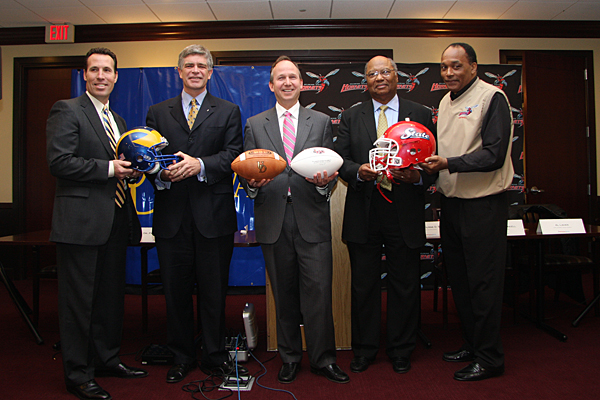CSJ Classic: Hail-Mary Passes in Delaware
Original Publish Date: Fall of 2010
February 24th, 2009 saw Delaware governor Jack Markell announce a long-awaited event for the first state: the scheduling of a football game between the two Division I schools in the First State, the University of Delaware and Delaware State University. “This is a significant day for these two outstanding institutions,” said Markell on that day. “And we certainly cannot forget the sports fans in Delaware who are big winners in this as well.”
Governor Markell must have known that down the road he would make another decision that would be a “significant day” for these institutions and the “sports fans of Delaware”, though in a much different way. It would be the day that Markell offered gambling on professional sporting events as a way to close a huge hole in the state budget for the 2010 fiscal year.
While sports betting in Delaware would not involve the Blue Hens or Hornets, Markell is certainly making a big gamble – that the NCAA will not ban the Blue Hens from hosting postseason competition, including FCS playoff games, over the issue. And it’s far from certain that Markell’s hail-mary pass will help Delaware, Delaware State, or the sports fans of Delaware.
Delaware’s Budget Crisis
Shortly before Markell showed up at the press conference announcing the Delaware/Delaware State regular-season game, the governor reportedly stared at a 109 million dollar revenue shortfall for the fiscal year ending in 2009 (and, according to reports from the Delaware News-Journal, an 800 million dollar budget deficit). This wasn’t a complete surprise: tax revenues all over the country have been way down, and Delaware, with its large financial sector, was unsurprisingly hit very hard.
Faced with 148 few million dollars of revenue for ’09, Markell took some swift actions to set a course correction, including slashing the salaries of state employees by 8 percent, imposing work furloughs on state workers, and raising the tax on cigarettes sold in the First State by 45 cents a pack. With an eye on a grim 2010 budget, Markell was clearly under pressure to do something to plug the hole.
Markell could propose raising taxes – but along with the undoubted political risks of doing so, Delaware House of Representatives requires a three-fifths majority to approve before new taxes could be imposed or to allow spending to increase past a legislated threshold.
Markell’s Hail Mary Pass
Markell chose to instead invoke a loophole available to the First State: to allow sports gambling with the state getting a cut of the proceeds.
In 1976, Delaware attempted a “sports lottery” that was, in effect, allowed bettors to bet on the results of pro football games. It was cancelled abruptly when the state realized one week that they were going to lose massively on NFL betting, but as a result Delaware was one of four states “grandfathered” in before a federal law was instituted to ban the state sponsorship of sports gambling. (Nevada, Montana and Oregon are the other three states.) Markell proposed dusting off the paperwork and reinstituting sports gambling in the 21st century for the First State. “The sports lottery is a competitive differentiation for Delaware that neighboring states cannot do,” Markell said when he proposed his budget with sports gambling in it.
Sports gambling certainly is something that the governor, Delaware legislators, and Delaware state employees find popular. It gets around the pesky Delaware state constitution which requires the three-fifths majority to levy new taxes, and it at least holds out hope that state employees won’t need to figure out how to live on 8 percent less a year.
But even with the rosiest of projections, it won’t close the state budget gap completely. With a projected gap of 751 million dollars, sports betting is only estimated to create 55 million dollars of revenue in its first year – assuming, of course, that the methods to deliver sports betting in Delaware gets set up in time, and the same issues that plagued the 1976 sports lottery don’t recur. Even then, that picture might be too optimistic: in Las Vegas, sports betting only comprises 1.2% of the total amount gambled there, and gambling returns nationwide are way down as folks have much less disposable income.
In addition to that, the NFL and NCAA have already lined up lawyers to try to prevent Delaware from instituting sports gambling in the state. While the state Supreme Court unanimously approved the constitutionality of sports gambling in Delaware, their ruling seems certain to be challenged further – if only for the reason that by allowing sports gambling in the state budget, they are voting for something that could be paying (or preventing a huge cut in) their own salary. Furthermore, their opinion that it reached the state constitutional requirement that it “raises money for the state” and thus can be considered a “lottery” seems threadbare – and ignores the fact that the lottery in 1976 was shut down for the very reason that it wasn’t a “lottery” and the state was poised to lose millions.

Hornet & Blue Hen Impact?
For Delaware and Delaware State, they may be damned if they do, damned if they don’t in terms of the sports gambling issue.
As public institutions, both schools rely on state funding to function. The previous governor of Delaware, Ruth Ann Miner, proposed in her budget a 3% cut in higher education, including a 5.7 million dollar cut for Delaware State and 20.1 million dollar cut at University of Delaware.
From their perspective, anything that would help prevent those cuts from occurring, or at least minimize the damage, would be welcomed. However, if sports gambling does come to pass in Delaware, the NCAA appear to have already decided to not allow their championships to be played in a “gambling state” such as Delaware.
NCAA officials certainly are aware of the situation – shortly after Markell proposed his budget, they flew to Dover where they held a series of private meetings on the matter. Markell called the NCAA’s reaction “retaliatory and inconsistent,” and offered as proof of that inconsistency the Las Vegas Bowl, held in the throbbing nerve center of American sports gambling. (Markell evidently was unaware that bowl games are not sanctioned by the NCAA and could be hosted in Sodom or Gomorrah as long as the twin cities of sin could fork over the money to sponsor them. FCS games for a NCAA-sponsored championship operate under very different rules than the Las Vegas Bowl.)
While such a ban could be challenged by the state of Delaware, upon first glance the NCAA can basically do what it wants in determining where it wants to sponsor its own events. At best for Delaware it would mean a long, drawn-out court battle.
Delaware State has never hosted a home playoff game in their history, but Delaware has hosted multiple home playoff games in the last decade to crowds over 15,000 and has been the frequent site of home playoff games. A postseason ban would not only mean the loss of pride to play playoff games away from home, the school (and surrounding area) would be faced with losing revenue from up to three games.
Delaware’s fight against the NCAA appears to have also ensnared Montana as well, one of the four other schools “grandfathered” to allow sports gambling. An NCAA official recently admitted that Montana’s hosting of two playoff games in their run to the FCS championship last year was an “oversight that wouldn’t happen again”. (Montana has a state-sponsored fantasy sports game that is considered sports gambling.) The NCAA plans to meet this summer to talk about what is legal and what is not.

Playoffs without Delaware or Montana Schools?
It seems inconceivable to have the FCS playoffs without Delaware, Montana or Montana State hosting playoff games – you have to go all the way back to 1990 to find a year when one of these three schools didn’t host a home playoff game. (Ironically, in that year Nevada, based in another gambling state, reached the national championship game.)
But the NCAA can choose the rules to determine its championship, and unless the NCAA, Montana, Montana State, Delaware, and Delaware Sate officials complete a hail-mary pass of their own FCS fans may very well see Delaware, Delaware State, Montana, or Montana State on the road throughout the playoffs.
That would be a real tragedy for FCS football fans everywhere. But it’s hard to see how it might be prevented.
It’s unfair to tell the state of Delaware that they can’t use revenue that’s available to them, even if it has little hope of balancing the state budget. Yet it’s also unfair to require the NCAA overlook gambling when they’re in the business of amateur athletics and absolutely must have a zero-tolerance policy on gambling for their athletes – even if they’re not always consistent on their readings of these rules.
Like in all things gambling, the only winner here in the long run appears to be the casino owners.

Chuck has been writing about Lehigh football since the dawn of the internet, or perhaps it only seems like it. He’s executive editor of the College Sports Journal and has also written a book, The Rivalry: How Two Schools Started the Most Played College Football Series.
Reach him at: this email or click below:

